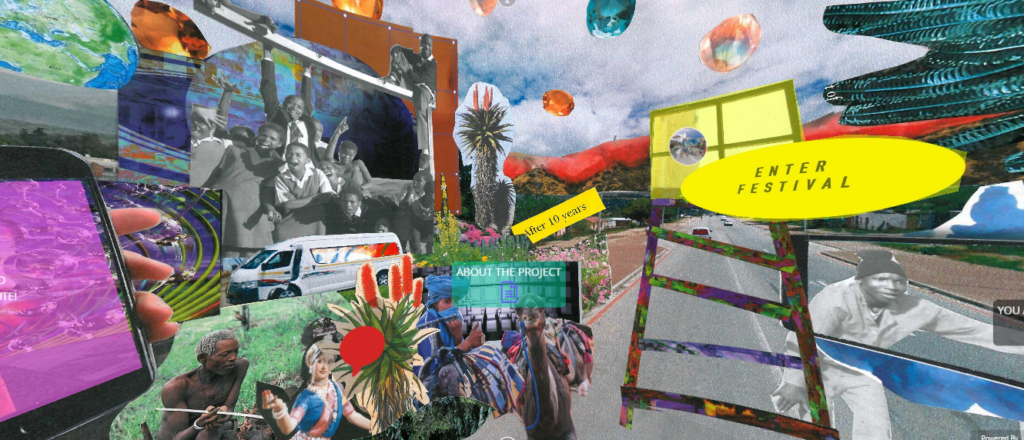By KIRAN MOLLOY
A creative vision for the National Arts Festival (NAF) in 2030 has been curated in the form of a 360-degree virtual collage of images, poems, letters, videos, voice notes and sound recordings by past festival participants and attendees.
The participants were asked to write letters to themselves from the future with the prompt: What will the festival look like in ten years’ time?
Covid-19 has severely affected many arts, culture, music, literary, art and comedy festivals celebrated throughout the country, including our own.
In response, and in collaboration with Future Festivals, Rhodes University, King’s College London, the South African Cultural Observatory and sponsorship from the UK Arts and Humanities Research Council, the National Arts Festival (NAF) encouraged participants to delve into the experiences they will see at the future festival; What has changed? What is new on the programme? Is some of the art being displayed online or virtually? Are some of the art and events viewed live? Are the audiences intimate, or are there crowds yet again? Are there new types of art being displayed? Will some performances be toured? How far do you see future NAF collaborations going, and with whom?
The Collective Collage Project has seen collaborations between a versatile range of professionals, including multi-medium artists Francois Knoetze and Duduetsang Lamola (blk banana), and teams from the NAF, Rhodes University and supporting institutions in the UK.
While Lamola, inspired by the letter submissions received, created complex interactive collages using corresponding imagery, Knoetze developed the dreamscape videos within the collage.
Lamola explains the project is there to show people how easy and accessible this type of software is to use and create virtual artwork when physical exhibitions are limited. She used backgrounds that correspond with real spaces in Makhanda that, despite spatial politics, represent the local people who attend and support the festival. In this way, she hoped to create an accurate and authentic representation of the future festival without forgetting its past and origins.
This project is supported by research done for the Future Festivals South Africa Project, which investigates the adaptive processes of local festivals through a collection of quantitative and qualitative data from festival audiences and mapping of the effects of Covid-19 on the attendance and occurrence of South African festivals. The project aims to reduce the impact of the pandemic on festivals by developing new ideas of performance and participation.
As expected, there were significantly fewer festivals in 2020 – just 115 – compared to 214 in 2019. The project recorded festival reactions to Covid-19 including those which held events that followed lockdown capacity regulations, those which had live audiences and live-streamed, those which were held completely online and the many which were cancelled.
The research includes three case studies of adaptive solutions practised by local festivals, including the Cape Town Carnival, Suidoosterfees and Buyel ‘Ekhaya.
The Cape Town Carnival spent the year planning, refining, and adapting to create the highly-anticipated ‘Walk the City’ Creative Hubs – a multi-location Carnival with five Covid-compliant venues with assigned walking paths through the city showcasing a range of small local businesses.
Suidoosterfees is a well-attended music and comedy festival that often draws crowds from the western part of the country. The festival was adapted into a live drive-in venue performance. Participants remained in and close to their cars and adhered to Covid protocols and safety regulations, as they enjoyed multiple comedy and music performances.
Buyel ‘Ekhaya is a popular music festival in the Eastern Cape that, due to Covid, hosted a televised virtual festival with attending audiences of about 400 000 people. Despite tackling the conversion from a live performance to a televised performance, the festival received many new viewers and followers and promised both virtual and live content in the future.
The Collective Collage project experienced many challenges. The project’s duration and method of data collection had to be altered and collected online instead of through crowd-sourced quiz responses during the physical festival planned for June this year.
Despite this, with open-mindedness and creativity, the project was adapted to receive its contributions online. This contributed to the project’s aspirations; to make the NAF a more mobile and decentralised festival that is accessible and appealing to a growing online audience.
With aspirations of fashion on the programme, language education workshops to accompany performances, translations and subtitles in a variety of international languages, continental collaborations and tours accumulated on the Collective Collage, inspiration is running deep, and the Festival continues to encourage and open our minds.
Images from:
https://www.future-festivals.org/
https://www.future-festivals.org/blog


